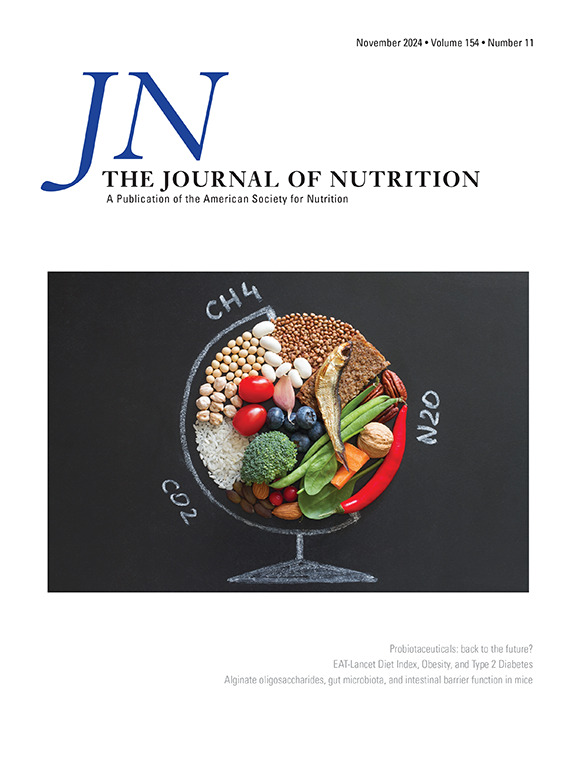实验小鼠结肠炎中发酵乳杆菌细胞外囊泡增强肠道屏障完整性,恢复肠道微生物稳态。
IF 3.7
3区 医学
Q2 NUTRITION & DIETETICS
引用次数: 0
摘要
背景:发酵乳杆菌(L. fermentum)已被证明可以改善肠道健康和治疗结肠炎;然而,其在炎症性肠病(IBD)中的确切疗效和机制尚不清楚。目的:本研究旨在评估发酵乳杆菌及其代谢产物、细胞外囊泡等成分是否能调节肠道屏障功能和肠道微生物群,以减轻葡聚糖硫酸钠(DSS)诱导的小鼠结肠炎。方法:48只小鼠随机分为6组:对照组(CON)、DSS组、乳酸菌发酵乳+ DSS组(LF + DSS)、热灭活乳酸菌发酵乳+ DSS组(LHF + DSS)、乳酸菌发酵乳上清液+ DSS组(LSF + DSS)、乳酸菌发酵乳胞外囊泡+ DSS组(LEV + DSS)。经过一周的驯化后,小鼠连续三周每天灌胃。每天制备新鲜培养物,包括活培养物(LF + DSS)、热灭活培养物(LHF + DSS)、上清(LSF + DSS)和细胞外囊泡(LEV + DSS)。最后7天,对照组给予正常水,其余组给予3% DSS。每天收集数据,然后从小鼠身上收集样本。结果:各治疗组患者体重变化、疾病活动指数(DAI)、肠道损伤、组织学评分均显著降低(P < 0.05),以LEV + DSS、LF + DSS效果显著。此外,与DSS组相比,LEV + DSS组和LF + DSS组结肠粘液分泌、claudin-1和occludin表达均显著升高(P < 0.05),促炎因子白细胞介素(IL) -1β和肿瘤坏死因子-α (TNF-α)降低(P < 0.05), IL-10升高(P < 0.05)。发酵乳杆菌及其组分显著调节肠道菌群α-多样性和β-多样性,影响整体组成。LEfSe分析显示,LF + DSS组的有益菌包括Prevotellaceae_UCG-001、Romboutsia和Ruminococcus, LEV + DSS组的有益菌包括Akkermansia、Odoribacter和Marvinbryantia。发酵乳杆菌及其胞外囊泡均可显著下调TNF-α和IL-1β基因表达,上调IL-10基因表达,从而减轻结肠炎症状。结论:本研究表明,发酵乳杆菌通过调节肠道菌群和加强肠粘膜屏障来缓解结肠炎,其细胞外囊泡可能在这一调节过程中发挥关键作用。本文章由计算机程序翻译,如有差异,请以英文原文为准。
Extracellular Vesicles From Lactobacillus fermentum Enhance Intestinal Barrier Integrity and Restore Gut Microbial Homeostasis in Experimental Murine Colitis
Background
Lactobacillus fermentum has been shown to improve intestinal health and treat colitis; however, its precise efficacy and mechanisms in inflammatory bowel disease remain unclear.
Objectives
This study aimed to evaluate whether L fermentum and its metabolites, extracellular vesicles, and other components could modulate intestinal barrier function and gut microbiota to alleviate dextran sulfate sodium (DSS)-induced colitis in mice.
Methods
Forty-eight mice were randomly assigned to 6 groups: control, DSS, L fermentum+DSS group (LF+DSS), heat-inactivated L fermentum+DSS group (LHF+DSS), L fermentum supernatant solution+DSS group (LSF+DSS), and L fermentum extracellular vesicles+DSS group (LEV+DSS). After a 1-wk acclimation, mice were gavaged daily for 3 wk. Fresh cultures, including live (LF+DSS), heat-inactivated (LHF+DSS), supernatant (LSF+DSS), and extracellular vesicles (LEV+DSS), were prepared daily. During the final 7 d, the control group received normal water, and the other groups received 3% DSS. Data were collected daily, followed by sample collection from the mice.
Results
In this study, significant reductions (P < 0.05) in body weight changes, disease activity index, intestinal damage, and histology scores were observed in the treatment groups, especially LEV+DSS and LF+DSS. Additionally, compared with the DSS group, colonic mucus secretion, as well as claudin-1 and occludin expression, increased significantly (P < 0.05) in the LEV+DSS and LF+DSS groups, whereas proinflammatory cytokines IL-1β and TNF-α decreased (P < 0.05) and IL-10 increased (P < 0.05) in the LEV+DSS group. L fermentum and its components significantly regulated gut microbiota α-diversity and β-diversity, affecting overall composition. Linear discriminant analysis effect size analysis revealed an enrichment of beneficial bacteria including Prevotellaceae_UCG-001, Romboutsia, and Ruminococcus species in the LF+DSS group and Akkermansia, Odoribacter, and Marvinbryantia species in the LEV+DSS group. Both L fermentum and its extracellular vesicles significantly downregulated the gene expression of TNF-α and IL-1β, whereas the expression of IL-10 was upregulated, thereby contributing to the alleviation of colitis symptoms.
Conclusions
This study reveals that L fermentum alleviates colitis through modulation of the gut microbiota and reinforcement of the intestinal mucosal barrier, with its extracellular vesicles potentially playing a key role in this regulatory process.
求助全文
通过发布文献求助,成功后即可免费获取论文全文。
去求助
来源期刊

Journal of Nutrition
医学-营养学
CiteScore
7.60
自引率
4.80%
发文量
260
审稿时长
39 days
期刊介绍:
The Journal of Nutrition (JN/J Nutr) publishes peer-reviewed original research papers covering all aspects of experimental nutrition in humans and other animal species; special articles such as reviews and biographies of prominent nutrition scientists; and issues, opinions, and commentaries on controversial issues in nutrition. Supplements are frequently published to provide extended discussion of topics of special interest.
 求助内容:
求助内容: 应助结果提醒方式:
应助结果提醒方式:


